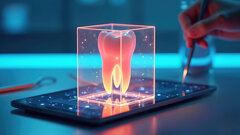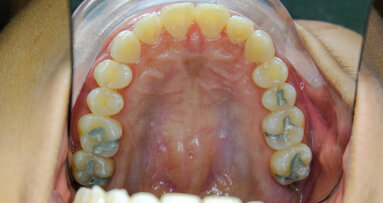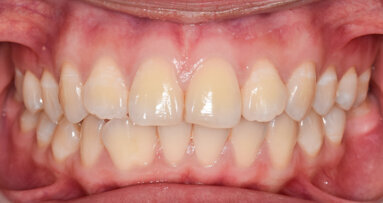RUGBY, UK/AMSTERDAM, Netherlands: According to the findings of a new study, most people do not just use their teeth for eating. The research by the Oral Health Foundation and Philips, as part of National Smile Month, found that 65 per cent of respondents frequently put their oral health at risk by using their teeth as a multi-tool.
The most common misuse of teeth is tearing Sellotape—more than four in ten admitted doing this regularly. More than a quarter bite their nails, and over a fifth use their teeth to carry things when their hands are full. Other popular uses include taking tags out of clothing (20 per cent), chewing pens and pencils (16 per cent), opening bottles (9 per cent) and doing up zips (4 per cent).
Commenting on the findings, Dr Nigel Carter, OBE, Chief Executive of the Oral Health Foundation, said that, while it may seem trivial, using our teeth as tools poses a considerable risk to our oral health. Carter said: “Anything from opening bottles to chewing foreign objects can damage existing dental work or cause our teeth to crack. There are also examples of teeth shifting out of place, chipping, and in some cases breaking, due to the pressure and strain. Accidents are also more likely to happen which could result in invasive and expensive emergency dental work.”
“We should stick to using our teeth for what they were designed to do—chewing our food so that it’s more easily digestible. Our teeth also help us to talk and make sounds. They also give our face its shape. Because of this, we shouldn’t be doing anything that could unnecessarily jeopardise them,” he concluded.
More than four in five 18- to 35-year-olds in the study admitted to abusing their teeth by performing unusual tasks with them. This is significantly higher than the 70 per cent of 35- to 54-year-olds and the 54 per cent of over-55s who made this admission.
The results are part of National Smile Month, a UK-wide health campaign that promotes the benefits of a healthy smile.
Tags:
EDINBURGH, UK: The Great Irish Famine is something etched into European history. The impact of the famine has been well documented, and in a new study that ...
BLOOMFIELD, Conn., U.S: Cigna, a worldwide health services organization, has recently released a study that helps confirm the connection between oral health...
LONDON, UK: Though the exact number of people who suffer from xerostomia is unclear, some studies estimate that as many as one in five of the population ...
SAN JUAN, Puerto Rico/SPRING, Texas, U.S.: Mercury in dental amalgam is a hidden source of global mercury pollution, resulting from factors such as the ...
AARHUS, Denmark: The effect a high-sugar diet can have on teeth is well documented; however, the effect it can have on periodontal health has not been as ...
PHILADELPHIA, U.S.: Stem cell research has been central to many developments in medicine. In a new study, scientists have investigated whether stem cells ...
CAMBRIDGE, UK: Scientists have recently found two primary teeth buried deep in a remote archaeological site in north-eastern Siberia. The discovery has ...
LONDON, Canada: The use of artificial intelligence (AI) in dentistry is rapidly expanding, offering new possibilities in diagnostics, treatment planning and...
GENEVA, Switzerland: Researchers from the University of Geneva (UNIGE) are seeking to learn why certain species of catfish are able to grow teeth outside ...
NEW HAVEN, Conn., U.S.: With between 100 and 200 different strains of bacteria in the human mouth at any one time, the oral cavity can be a highly contested...
Live webinar
Tue. 24 February 2026
1:00 pm EST (New York)
Prof. Dr. Markus B. Hürzeler
Live webinar
Tue. 24 February 2026
3:00 pm EST (New York)
Prof. Dr. Marcel A. Wainwright DDS, PhD
Live webinar
Wed. 25 February 2026
11:00 am EST (New York)
Prof. Dr. Daniel Edelhoff
Live webinar
Wed. 25 February 2026
1:00 pm EST (New York)
Live webinar
Wed. 25 February 2026
8:00 pm EST (New York)
Live webinar
Tue. 3 March 2026
11:00 am EST (New York)
Dr. Omar Lugo Cirujano Maxilofacial
Live webinar
Tue. 3 March 2026
8:00 pm EST (New York)
Dr. Vasiliki Maseli DDS, MS, EdM



 Austria / Österreich
Austria / Österreich
 Bosnia and Herzegovina / Босна и Херцеговина
Bosnia and Herzegovina / Босна и Херцеговина
 Bulgaria / България
Bulgaria / България
 Croatia / Hrvatska
Croatia / Hrvatska
 Czech Republic & Slovakia / Česká republika & Slovensko
Czech Republic & Slovakia / Česká republika & Slovensko
 France / France
France / France
 Germany / Deutschland
Germany / Deutschland
 Greece / ΕΛΛΑΔΑ
Greece / ΕΛΛΑΔΑ
 Hungary / Hungary
Hungary / Hungary
 Italy / Italia
Italy / Italia
 Netherlands / Nederland
Netherlands / Nederland
 Nordic / Nordic
Nordic / Nordic
 Poland / Polska
Poland / Polska
 Portugal / Portugal
Portugal / Portugal
 Romania & Moldova / România & Moldova
Romania & Moldova / România & Moldova
 Slovenia / Slovenija
Slovenia / Slovenija
 Serbia & Montenegro / Србија и Црна Гора
Serbia & Montenegro / Србија и Црна Гора
 Spain / España
Spain / España
 Switzerland / Schweiz
Switzerland / Schweiz
 Turkey / Türkiye
Turkey / Türkiye
 UK & Ireland / UK & Ireland
UK & Ireland / UK & Ireland
 Brazil / Brasil
Brazil / Brasil
 Canada / Canada
Canada / Canada
 Latin America / Latinoamérica
Latin America / Latinoamérica
 USA / USA
USA / USA
 China / 中国
China / 中国
 India / भारत गणराज्य
India / भारत गणराज्य
 Pakistan / Pākistān
Pakistan / Pākistān
 Vietnam / Việt Nam
Vietnam / Việt Nam
 ASEAN / ASEAN
ASEAN / ASEAN
 Israel / מְדִינַת יִשְׂרָאֵל
Israel / מְדִינַת יִשְׂרָאֵל
 Algeria, Morocco & Tunisia / الجزائر والمغرب وتونس
Algeria, Morocco & Tunisia / الجزائر والمغرب وتونس
 Middle East / Middle East
Middle East / Middle East












































To post a reply please login or register